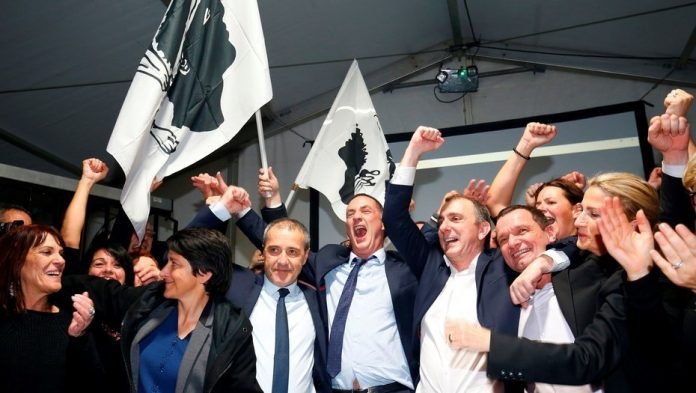We are inclined to think that the December 2017 Corsica election is not only a triumph of nationalism, but it will also unleash political shockwaves. The historic results gained by the coalition Pe a Corsica with a 56,5% vote in the second round should temper the rigid political position held by French Jacobinism; from now on, Paris will not be able to turn a cold shoulder to the political demands of the island’s nationalists. More so if we take into account that the Corsican nationalists have secured absolute majority, 41 out of 63 benches in the new Corsican Assembly.
The coalition Pe a Corsica formed by the autonomists Femu a Corsica and the pro-independence Corsica Libera continues its successful path. It started in the 2015 regional election, getting a 45% representation in the Corsican Assembly, close to majority. The June 2017 French election confirmed their success, by gaining 3 in 4 deputies of the island. The phenomenal December results, with a 65% representation in the island’s Assembly, stand for a marked rising trend, and Paris will have to take notice.
Different factors come into play: First of all, the National Liberation Front of Corsica disbanded in 2014, paving the way for a nationalist collaboration. Secondly, the deficiencies in the island’s leftist and rightist French discourse, which excite less and less the Corsicans, especially the young. Thirdly, Corsican nationalists have masterly elaborated a discourse of hope that has struck a chord with the people.
By means of these elections, Corsica has gained a Territorial Collectivity status, instead of the two departments existing in the island so far. Additionally, it will actually entail that the Main Assembly of the island is getting the reins of further powers. No one really knows the scope of these powers, since they are pending negotiation with the central government. For instance, the Corsican Assembly has not had legislative power so far, since Paris has not devolved such powers to anyone in France, a telltale reminder of its Jacobinism.
Besides legislative and taxation powers, Corsican nationalists focus on three demands, i.e. Co-officiality of Corsican, resident status, and amnesty to FNLC political prisoners.
As regards language, it has been subject to a long, Jacobin tradition aiming at language extinction, meaning that the Constitution only allows one language, French, and the fact that by contrast Corsican nationalists speak Corsican in the island’s Assembly clearly annoys many a French. Furthermore, steps taken in that direction may encourage Basques, Britons and Alsatians to follow the path.
The resident status targets the model of mass tourism and its detrimental consequences, for the benefit of the island’s inhabitants. Corsica remains one of the poorest French territories, with tourism as its main industry. By contrast, Corsican nationalists support an economic model that guarantees sustainable development.
The two forces, autonomist and pro-independence, integrating the coalition Pe a Corsica agree that their short-term goal is gaining wide autonomy, ruling out a self-determination referendum. Jean-Guy Talamoni, president of the pro-independence party Corsica Libera, is well aware that autonomy needs to reassert itself in order to move forward to independence.
Gilles Simeoni and Jean-Guy Talamoni stand for the main assets of the coalition Pe a Corsica. Simeoni stood at the front of the coalition, as well as presiding over the Corsican government. The president of the autonomists Femu a Corsica has repeatedly voiced his aspiration to have autonomy in the Catalan style, despite differing with the independence process pursued there.
On the other hand, Jean-Guy Talamoni, president of Corsica Libera, is a long-running pro-independence politician. It has held the presidency of the Corsican Assembly to date, and has often hailed the Catalan independence process. He never sings the French anthem along in official events, and does not sport a French ribbon. He speaks Corsican whenever he stands an opportunity, stirring the fury of French Jacobins.

